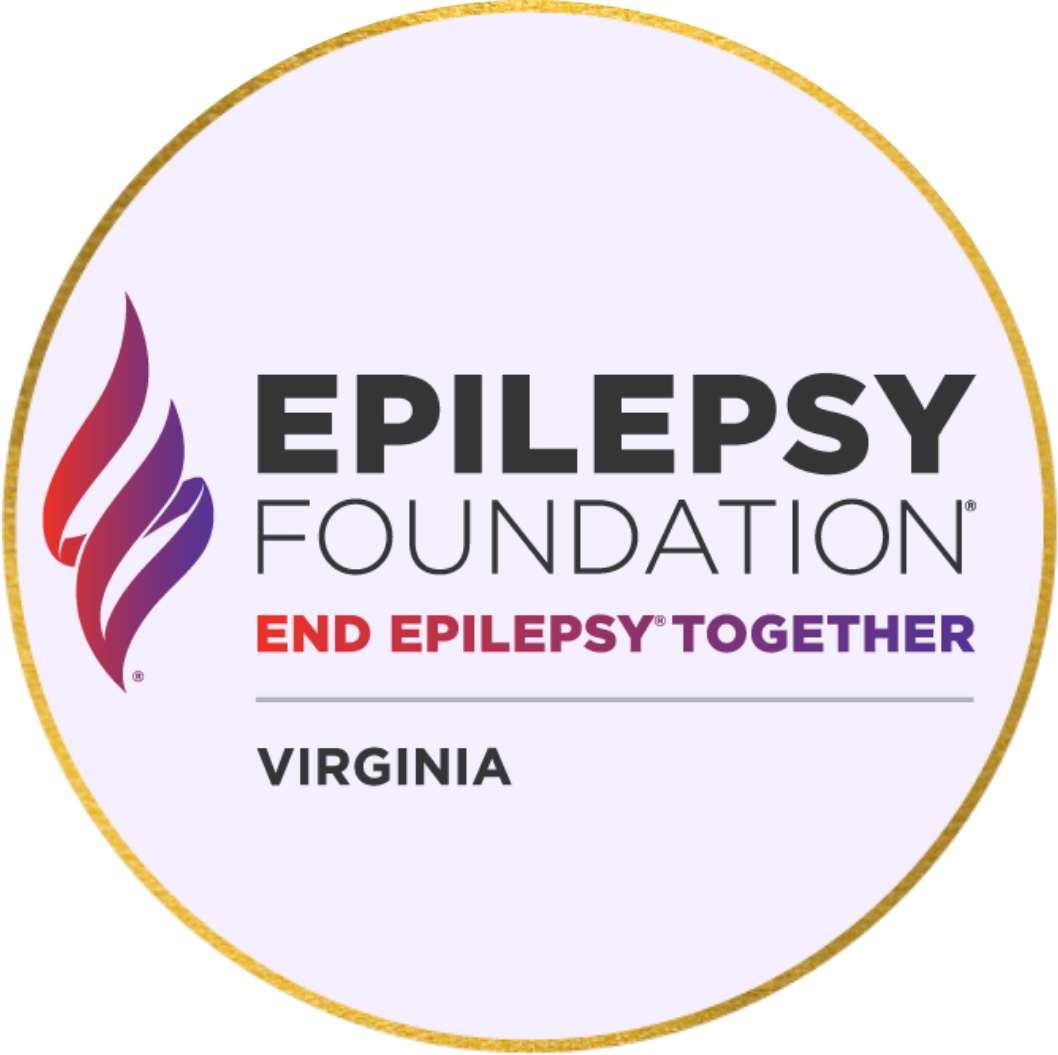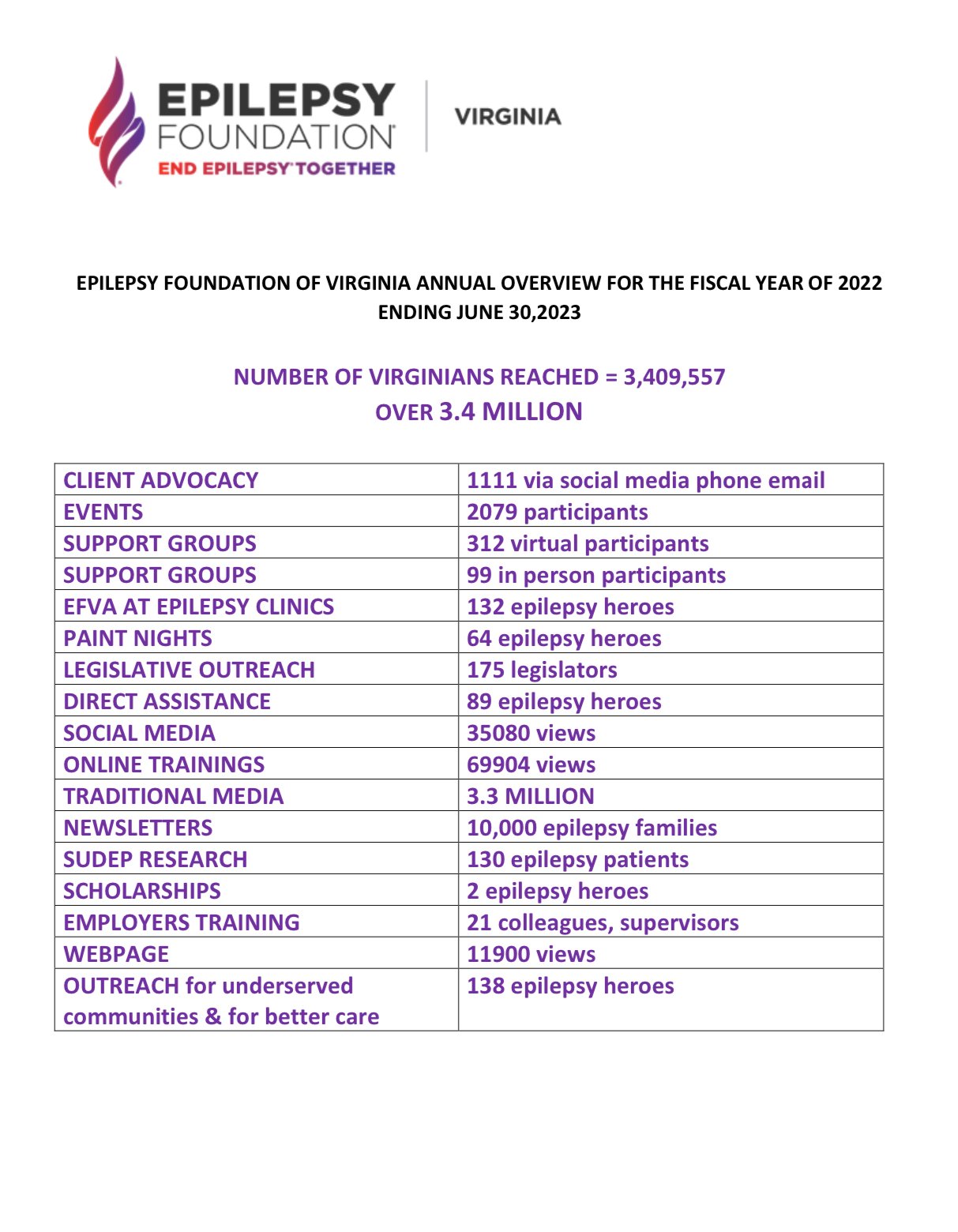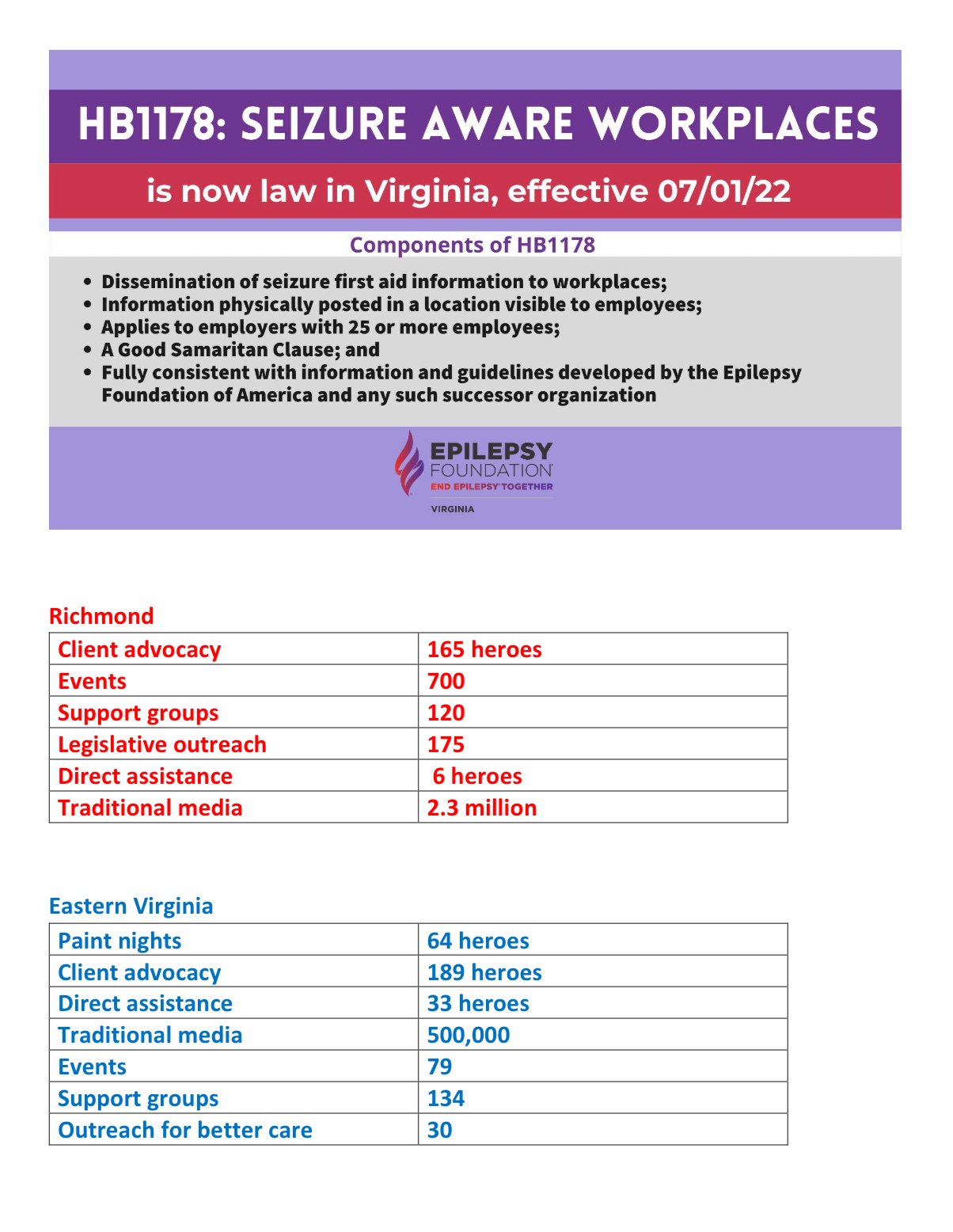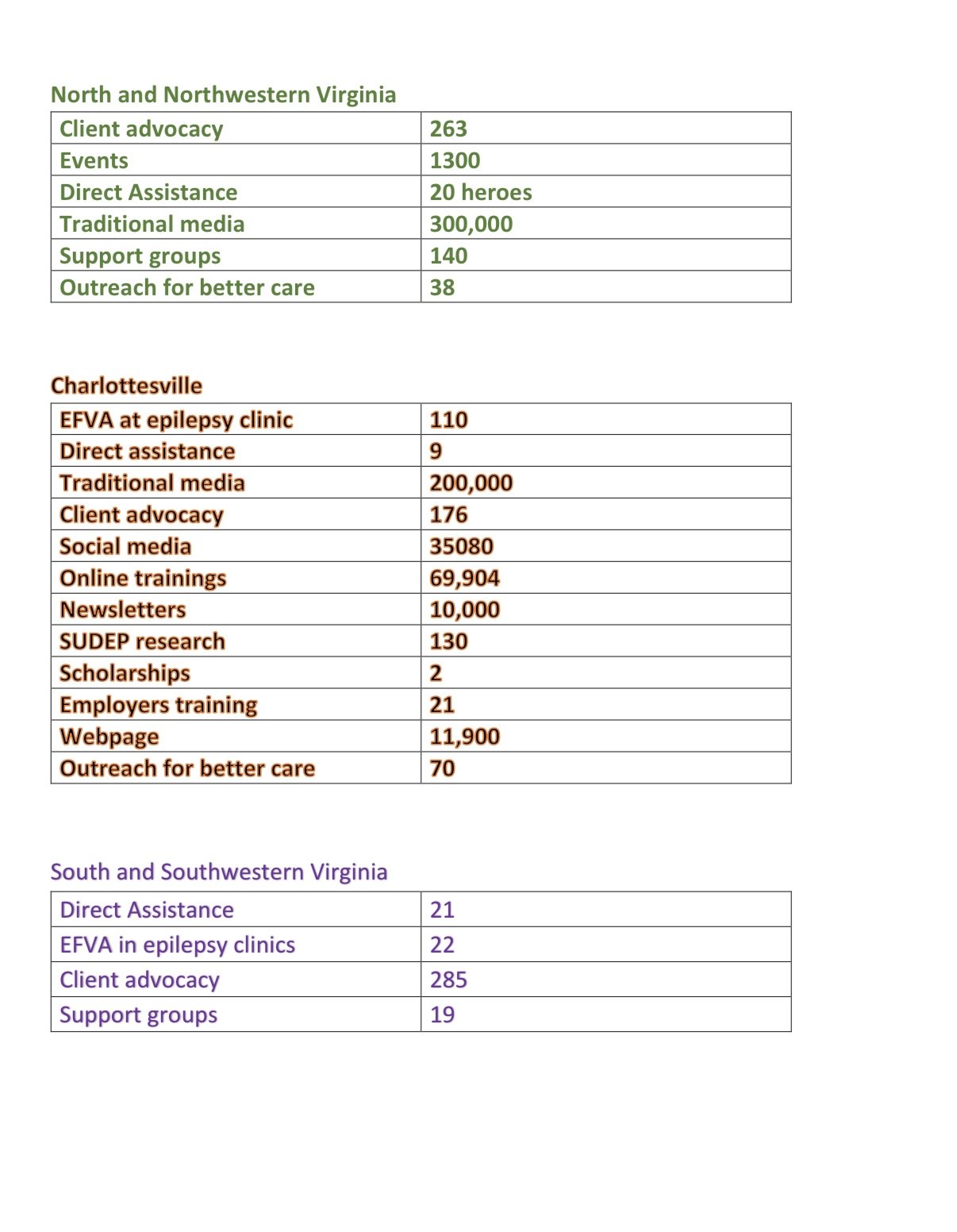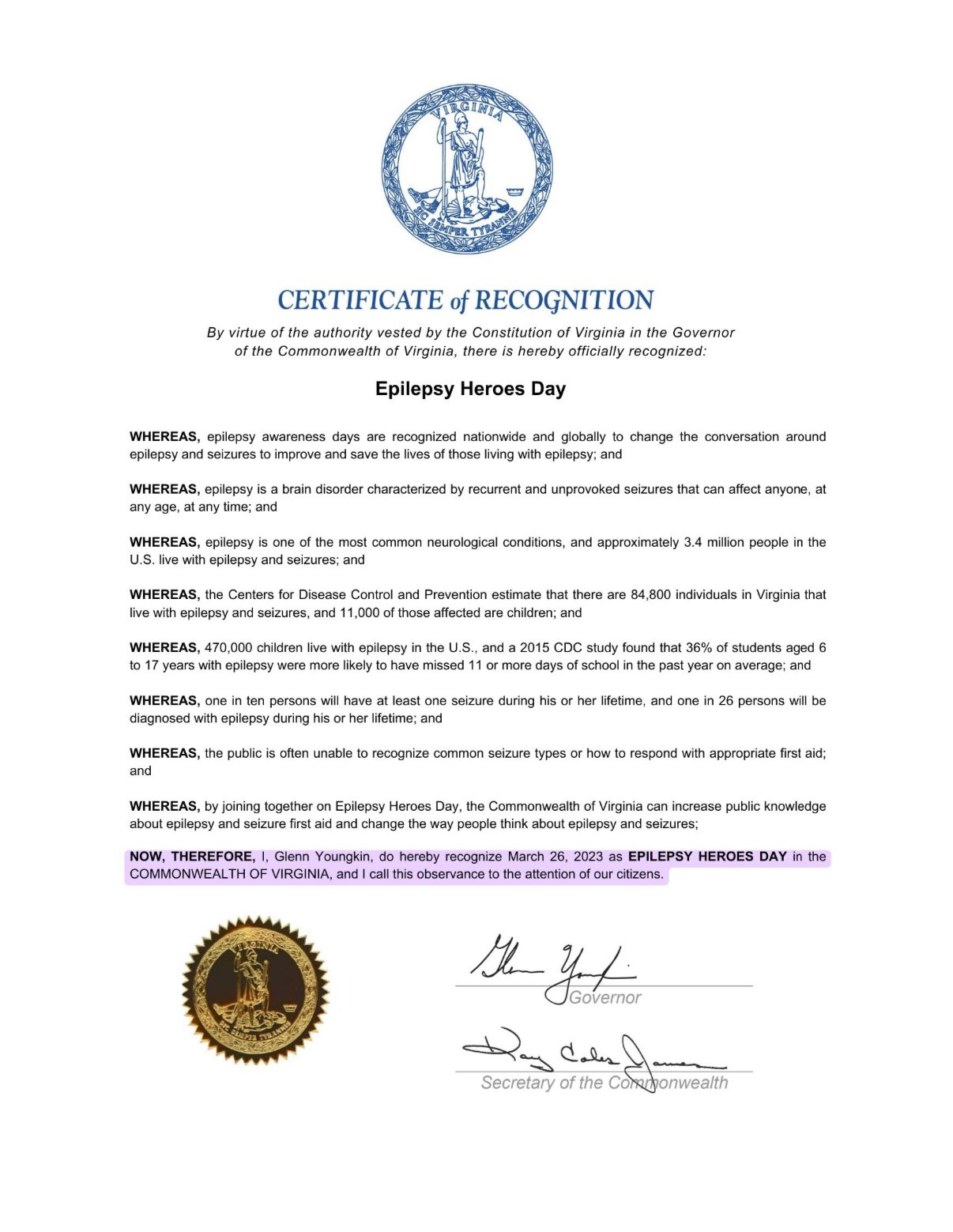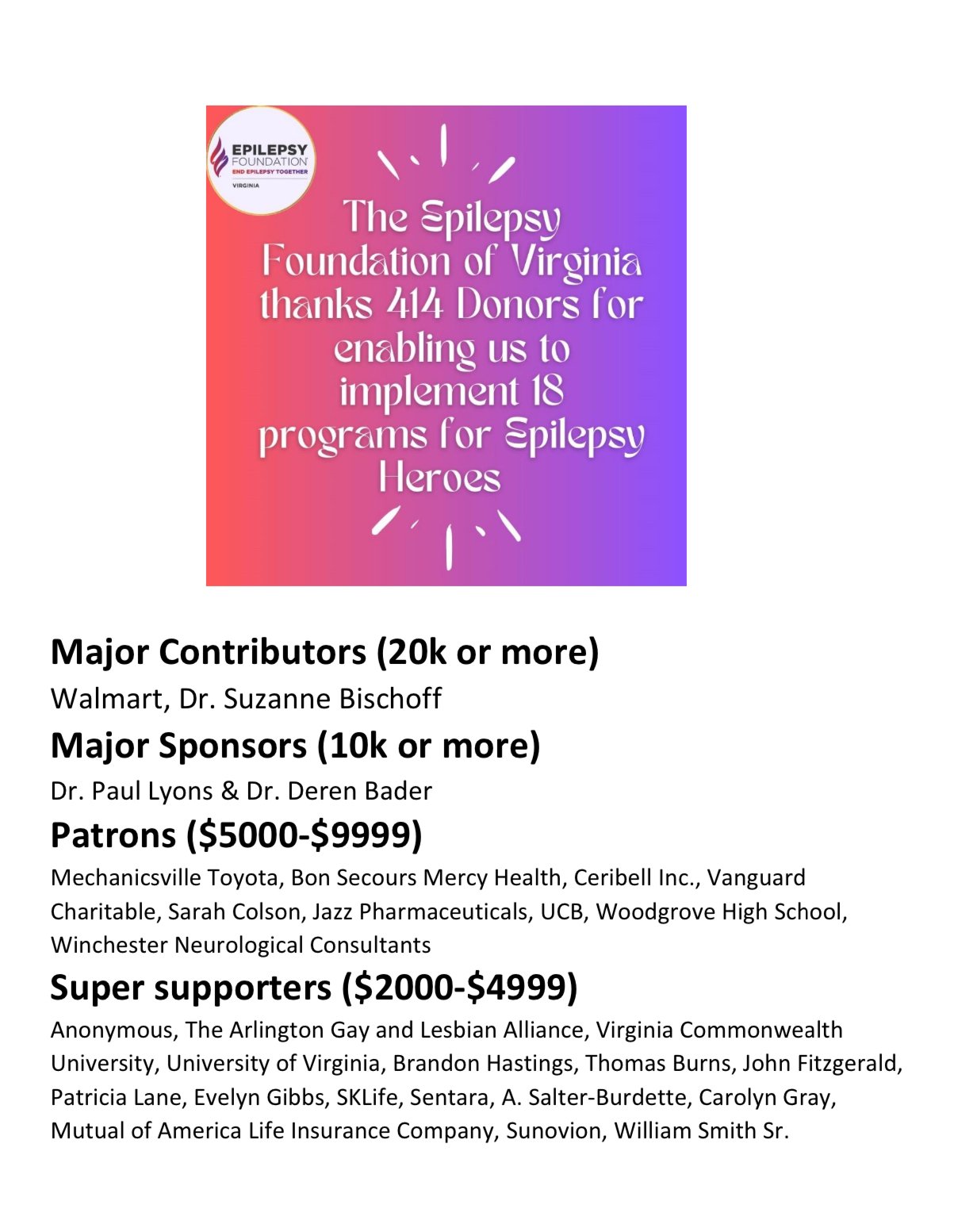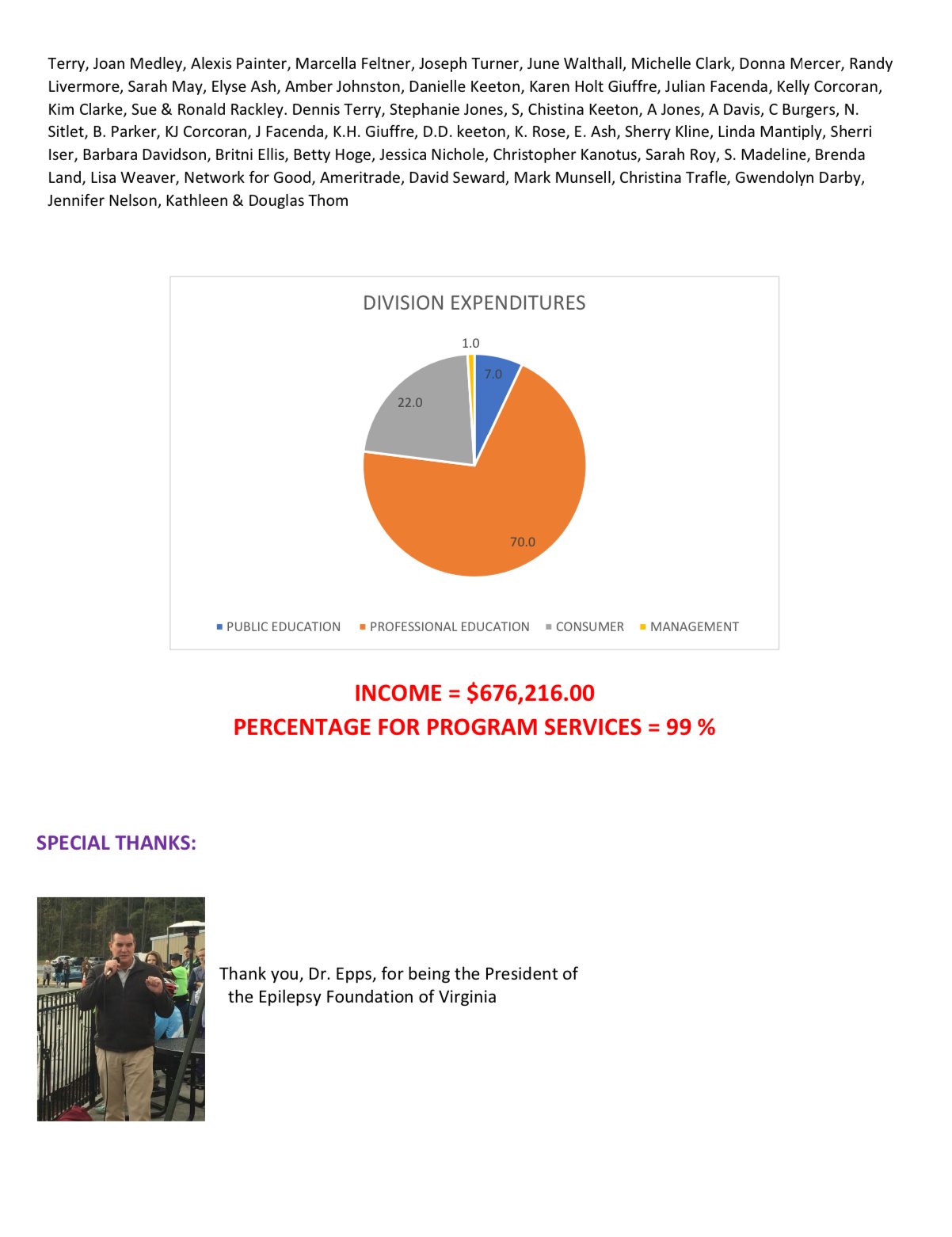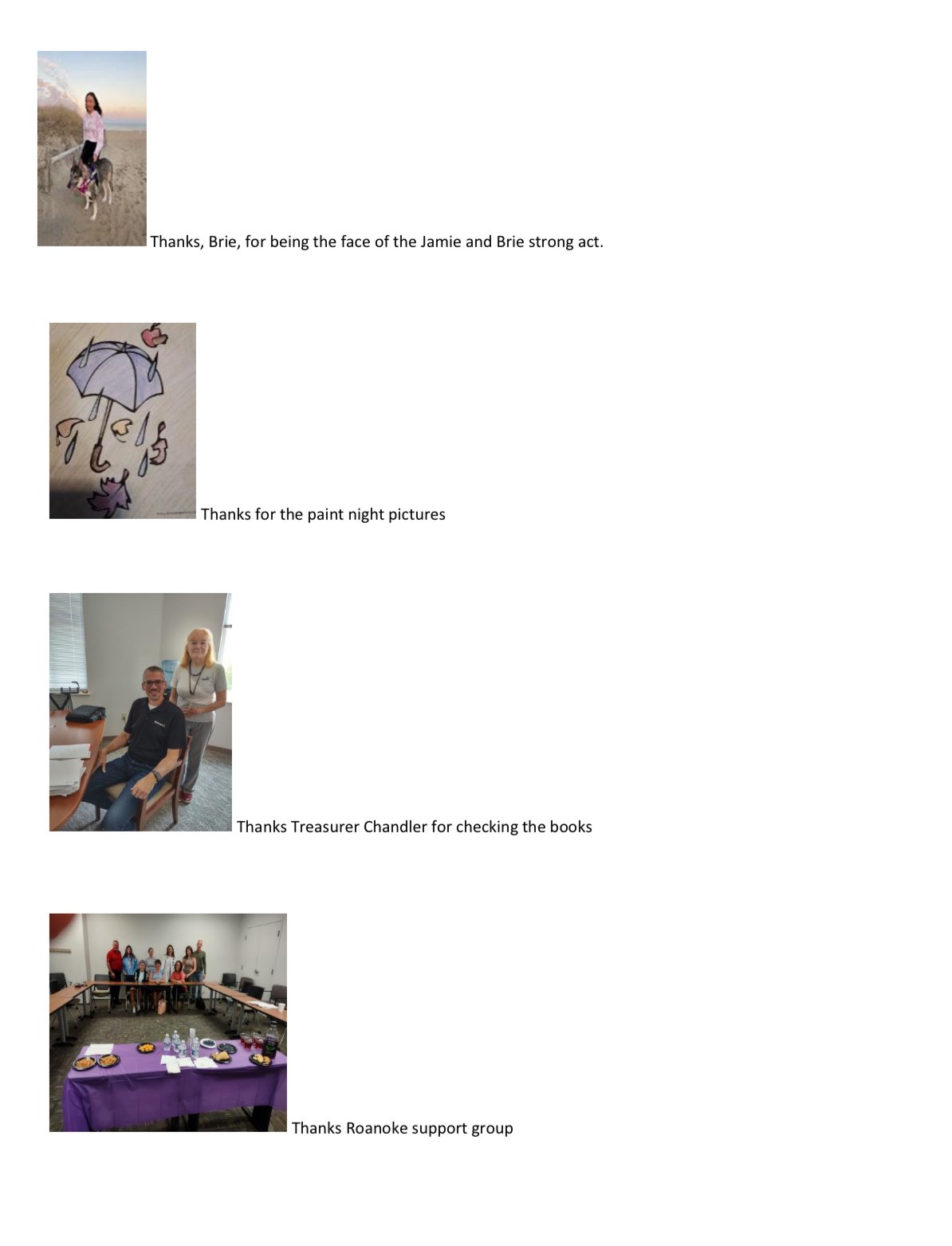|
ELIZABETH HART DALTON SCHOLARSHIP IS OPEN FOR ANOTHER MONTH
|
|
|
We wish to remember Elizabeth Hart Dalton’s many contributions by our scholarship. Elizabeth was a frequent and excellent speaker for the Tour de Midnight until she lost her battle with epilepsy.
In her honor, the Epilepsy Foundation of Virginia is offering two scholarships for $2500 each. The recipient of the Elizabeth Hart Dalton Scholarship should be a student who has shown courage in dealing with epilepsy and seizures, commitment to their education, and perseverance in eliminating the obstacles that epilepsy and seizures may present.
EFVA heard from several epilepsy heroes who are working on their applications and we wish them to participate. Therefore, we have extended the deadline to May 31st, 2024. The Executive Director and Regional Directors are willing to help with the application. Go to epilepsyva.com/ourteam to find our team.
|
|
We want to thank Richmond Regional Director, Adam Gibson, for his hard work on the following Virginia legislations:
For VIRGINIA EPILEPSY HEROES DAY:
VA Senate Bill SJ27 designates March 26, 2024 and in each succeeding year, as Epilepsy Heroes Day in Virginia. Governor Youngkin states that the recognition of Epilepsy Heroes Day in Virginia can "increase public knowledge about epilepsy and seizure first aid and change the way people think about epilepsy and seizures."
For Bill 689 SUDEP:
Thanks to Delegate Seibold and Senator Pekarsky for introducing the bill in the House and Senate, and for their work resulting in having the bill approved by the Health and Human Services Committee. We look forward to working alongside their offices in the future to secure full passage of the bill.
|
|
|
EPILEPSY HEROES DAY CELEBRATION IN NORFOLK
|
|
|
Despite a rainy start, 87 epilepsy heroes gathered for the Epilepsy Heroes Day celebrations in Norfolk, VA on March 29th. They were greeted with warm beverages and pastries.
The event featured a lineup of exceptional speakers, including Ethan Boudreau, who shared his personal journey of overcoming epilepsy-related obstacles to achieve success as an editor at Channel 13 in Norfolk.
Lisa Bromley, a dedicated Epilepsy mother, shed light on the realities and challenges of caring for a child with epilepsy, illustrating moments of concern with a humorous anecdote about repeatedly checking on their well-being, only to be met with a humorous eye-roll.
Hero and Regional Director Lowell Evans shared his tireless efforts to raise awareness and understanding about epilepsy, while pediatric neurologist Michael Strunc emphasized the critical importance of having a seizure action plan and access to proper medical interventions. Neurologist Maria Guina delved into various facets of epilepsy, covering topics ranging from employment to medication, and the sobering issue of SUDEP (Sudden Unexpected Death in Epilepsy). Epileptologist Daniel Graf provided insights into the latest advancements in ketogenic diets and their potential benefits for epilepsy patients.
Following engaging panel discussions, attendees indulged in a hearty Southern lunch. Throughout the meal, discussions centered on support groups like the Foster support group in Norfolk, the CVC support group in Richmond, and the Northern Virginia support group. Led by MC Suzanne, EFVA staff member Adam Gibson provided updates on legislative initiatives and Dennis Terry mentioned the expansion of Tour de Midnight.
Young heroes were encouraged to explore opportunities like the Elizabeth Hart Dalton Scholarships, with EFVA Board member Ruchelle Buenaventura offering guidance and support. Overall, the event served as a powerful reminder of the resilience and unity within the epilepsy community, leaving attendees inspired and empowered to continue their journey as epilepsy heroes.
|
|
The Inova Support Group meets on the first Tuesday of every month.
Email Erinn.o'grady@inova.org or text (571) 472-4199 for the Zoom link
|
|
|
The EFVA Central Virginia Chapter Epilepsy Support Group meets on the second Monday of every month.
Scan QR code to join or email Jennifer at cvc@gmail.com for the link
|
|
|
In-person support group in Roanoke, VA
There were 6 people on the April 4 meeting so we're now considering having Zoom meetings. Those who are keen on coming to in-person meetings, please email srb3m@uvahealth.org
|
|
|
SHARE Support Group
https://www.meetup.com/Washington-DC-metro-Epilepsy-Meetup/
The group meets twice a month.
- The first meeting is hybrid and the second meeting is online
- Meeting dates and topics are announced on website
Contact Marc Starnes for more information or with any questions:
(571) 278-6524
marc.starnes1@gmail.com
|
|
|

|
On October 19th we're celebrating the 9th annual Tour de Midnight.
You can register for either of the 3 participating locations as riders or volunteers:
1. Main location: Midnight Brewery in Rockville, VA
2. Satellite location: Frothymoon Brewery in Williamsburg, VA
3. Satellite location: Caboose Tavern in Vienna, VA
Email dterry356@gmail.com with any questions
|
|
The Executive Director always enjoys visiting Dr. Epps, the President of the EFVA, and the helpful Bon Secours Neurology staff. Several staff members are excellent volunteers for the Tour de Midnight.
Thank you to Natasha Hanvey for taking the pictures
|
|
|
OUR DOCTORS ARE THE BEST!!!
|
|
|
We have always known it, and frequently proclaimed it, but now it is official!!
The January 2024 issue of Virginia Business has come out with their 1st every list of Virginia’s Top Doctors, and guess who is included?
- Dr. Stacey L. Epps, President of the EFVA
- Dr. Nathan B. Fountain, Chair of the EFVA’s Professional Advisory Board
- Dr. Howard P. Goodkin, member of EFVA’s Professional Advisory Board
Virginia Business contacted 10,000 medical professionals throughout the Commonwealth of Virginia, asking those physicians to identify which of their peers were the top doctors across 60 categories of medical specialties. Drs. Epps, Fountain and Goodkin were voted as among the top doctors in the field of Neurology.
The Epilepsy Foundation of Virginia is very fortunate to have these doctors as members of our team! We have always known them to be the best, contributing their significant knowledge to our organization to help our heroes, and now their peers have also recognized them as leaders in their field!
The next time you come in contact with one of these fine professionals, congratulate them on their inclusion in this exclusive list! We are extremely fortunate to have them contributing their time and resources to help us help you!!!
|
|
|
EFVA'S ONCE A YEAR DIRECT ASSISTANCE
|
|
|
The EFVA offers once-a-year direct assistance of $300.00 to Epilepsy Heroes. reach out to Regional Directors to get information of how to apply. (Epilepsyva.com/ourteam)
The following measures are proposed to prevent some misunderstandings so that Epilepsy Heroes can get their assistance sooner:
- By opening a Zelle account and giving the right information about the account. Zelle customer services are helpful 1 (844) 428-8542.
- If clients use their home address, it helps to send a picture of their most recent anti-epilepsy medication bottle to the Regional Directors so the addresses can be compared by our team.
- If the check is received at your home, please deposit it as soon as possible. All banks now have the option to deposit the check from your phone by taking a picture through your bank app. Regional Director, Lowell Evans, is willing to help with depositing checks. (efva.evans@gmail.com)
- Hopefully, clients will understand that EFVA cannot send a second check until the amount of the undeposited check has been reimbursed by the bank. The bank does such after 90 days (about three months).
|
|
Dive into the world of creativity with our Paint Nights, occurring thrice a month on Tuesdays from 6-7 pm. The artistic fun takes place in the virtual realm, so come and join EFVA in this engaging event.
Paint Nights for Epilepsy Heroes generate great pictures and people have fun! Please contact Regional Director, Lowell Evans, at efva.evans@gmail.com for the Zoom link
|
|
|
LOWELL EVANS SPOKE ABOUT EFVA IN KELLAM HIGH SCHOOL
|
|
|
Many of the students asked, "What do we (The Epilepsy Foundation of VA) do to help others who have epilepsy and how can they help?"
Lowell told them they should:
- "Learn more about epilepsy and what it is
- Learn about Seizure First Aid
- Spread the word about epilepsy
- Invite a person to talk about epilepsy
- Tell others about the scholarship the EFVA has for students going to college who have epilepsy
- Mention the once-a-year direct assistance of $300.00 for people who have epilepsy and reside in the Commonwealth of VA"
|
|
|
|
EPILEPSY AND SUMMER ACTIVITIES
|
|
|
Swimming and Water Sports
Swimming and water sports are a great way to relax, refresh, have fun, and exercise! Being in and around water requires safety precautions for everyone, including someone who has seizures. Water safety tips include:
All adults and children with epilepsy, regardless of seizure frequency or severity, should speak to their healthcare team about water safety. Some people may be advised not to swim at all. Others may be allowed to swim and participate in water activities with precautions and supervision.
Learn to swim! If your doctor is okay with water activities and you enjoy being in or around the water, then become a strong swimmer.
Swim with a friend or family member who is familiar with your seizures and is strong enough to help you.
Adults must closely supervise children around water.
If possible, swim in a designated area (pool or roped off area of open water) supervised by a lifeguard. Tell the lifeguard you have epilepsy and what should be done if you have a seizure.
Avoid swimming when you are tired or don't feel well.
Swimming in the ocean, or other open water, is not as safe as swimming in a pool. In the ocean there are currents, tides, sudden changes in water depth, and colder water temperatures that can lead to problems. Every person, including those with epilepsy, needs to be aware of their surroundings and take extra care in open bodies of water.
If you have a seizure in open water, it may be harder for someone to see that you are having a seizure or to get to you quickly.
Wear a life jacket for all water activities, including boating, water skiing, rafting and fishing. Check all life jackets and personal flotation devices to make sure they fit well and work properly.
If you have a seizure in water and are not fully aware or conscious, this can be a life-threatening situation. Even you appear to fully recover, call an ambulance (911) as you may require a full medical evaluation.
Plan time to learn for you and your loved ones to learn CPR (cardiopulmonary resuscitation), especially if you plan to spend plenty of your summer in and around water. In the time it takes for paramedics to arrive, CPR skills could save someone's life.
Cycling
Riding a bicycle is a great way to spend time outdoors, commute in the nice weather, and get in some healthy exercise. If you have seizures, depending on the type and severity, some safety tips include:
Every person who rides a bicycle should wear a helmet and reflective clothing.
Choose the safest route. It may be better to avoid cycling on busy roads and instead enjoy the safety of a dedicated bike path.
Share your planned biking route with someone before going out, especially if you are biking alone. Carry a phone, smart watch, or other device with a GPS tracking feature.
Remember to drink water and stay well hydrated on long rides.
For long rides, plan ahead so you can take your seizure medication at the regular scheduled time.
Speak with your healthcare team about your plans to cycle. Ask for advice about safety and how to avoid risks based on your seizure history.
Travel
Taking a summer vacation is something many people look forward to. It is important to plan in advance how you will manage seizures while traveling. Depending on your seizure type, preparing for travel may include:
Speaking with your healthcare team about adjusting dosage times for medications in different time zones.
Knowing the regulations for transporting medications (particularly when bringing liquid formulations on a plane).
Depending on the type of travel and the length of your trip, you may need a note from your doctor about carrying medicines with you.
Making plans in advance to avoid disruption in sleep schedules. If you know it is impossible for you to rest on a plane, avoid long, overnight flights.
Prepare ahead with the appropriate travel insurance in case you need medical care while traveling.
Heat and Seizures
Summer can bring extreme temperatures. Some people with epilepsy may be sensitive to heat. Staying cool is important. Considerations for staying cool in warm weather include:
Limit sun and heat exposure. Plan activities in the early morning or late afternoon and evening. This helps you avoid the warmest temperatures in the middle of the day.
Dress in lightweight and light-colored clothing.
Drink water before, during, and after physical activity to help keep your body temperature cool.
When temperatures are high, spend time in buildings with air conditioning, such as museums, indoor playgrounds, libraries, or shopping centers.
If a person has extreme heat intolerance, wearing a cooling vest may be helpful.
Listen to your body. If you feel weak, dizzy, or thirsty, find a place to rest in the shade. Drink water, tell someone (family member, lifeguard, camp counselor, coach, or friend) how you are feeling and take a break. Ask them to stay by your side until you feel better.
Amusement and Water Parks
Families often like to spend time at amusement and water parks during the summer. Many people with epilepsy can participate in these activities without difficulty, but some people need to plan ahead to stay safe. Some things to consider before heading to the park include:
How do your seizures affect you? What risk might an amusement park ride or water slide ride present if you were to have a seizure while participating?
Have a friend or family member with you who is strong enough to help if you have a seizure.
What activities at the park might be similar to your seizure triggers? For some people, excitement or stress from to rides, noise, or crowds may trigger a seizure. Some amusement park rides have flashing lights that can be a trigger for some people with photosensitive epilepsy.
Read all signs before going on any ride. Make sure the ride is suitable and safe for you. Consider how having a seizure during the ride may affect your ability to respond, your safety, and the safety of others.
Follow the water safety rules listed above for swimming when you are having fun at the water park.
Yard Safety
Staying safe at home should be a priority for everyone. People with drug-resistant epilepsy may sometimes need extra safeguards in outdoor spaces. A few things to consider:
Use lawn mowers and other power garden tools with caution. A lawn mower, grass, or hedge trimmer that switches off automatically when the handle is released may help reduce injury if you have a seizure. If your seizures are not well controlled, talk to your healthcare team about safety limits and precautions for outdoor garden tools.
Be aware of the risk of burns when using an outdoor grill or barbecue. Take precautions for safety around sources of heat.
If you or a loved one has seizures that cause them to fall, avoid rough concrete or gravel surfaces. Consider grass, bark mulch, or wooden decking as safer options to reduce the risk of injury from a fall.
Make sure appropriate safety railings are in place on elevated decks and patios.
If you wander or fall during a seizure and you live near an open body of water or if you have a pool, use a fence as a safety barrier.
Outside home improvement projects (painting, window washing, gutter cleaning, etc.) are often on the summer to-do list. If you have seizures that impair your awareness or cause you to fall, avoid climbing ladders.
General Summer Safety Guidelines
We encourage you to talk with your loved ones and healthcare professionals to make your summer as safe and fun as possible! Follow a seizure action plan, and take necessary precautions to minimize your triggers. By being proactive and prepared, you can enjoy those long summer days with peace of mind. Here are some reminders for you as the summer begins:
Talk to your epilepsy doctor or nurse about your plans for summer and ask their advice about choices you may need to make.
Share your plans for summer fun with the people closest to you and invite them to participate with you.
Inform lifeguards, camp counselors, coaches, and travel guides of your epilepsy and your seizure action plan.
Stay hydrated before, during, and after activity.
Eat nutritious meals. Plan ahead with healthy snacks and a good water supply for extended periods of activity.
Always take your seizure medications as directed, regularly and reliably.
Keep good sleep habits and avoid strenuous activities if you are not well rested.
Wear appropriate protective gear for activities (e.g., bike helmet, life vest, etc.).
When around water, have someone with you who knows what your seizures are like and is able to help if a seizure occurs.
If you are going for a walk, hike, jog, or bike ride alone, follow standard safety guidelines. Always tell someone your route and how long you expect to be gone.
Wear or carry something (medical alert bracelet, necklace, wallet card, smart watch, or phone) that identifies your epilepsy and has a seizure action plan.
Avoid activities that are known to place someone with epilepsy at high risk: boxing, high altitude activities like rock and mountain climbing, bungee jumping, scuba diving, sky diving, hang gliding, and paragliding.
|
|
|
WE ARE GRATEFUL FOR YOUR SUPPORT.
OUR EPILEPSY COMMUNITY IS STRONGER EACH YEAR BECAUSE OF YOU. THE EPILEPSY FOUNDATION OF VIRGINIA WISHES TO THANK YOU !
|
|
|
REGISTER FOR EVENTS by following guidelines on our calendar.
|
|
|
Interested in EFVA Financial Documents?
Follow this link:
|
|
|
|
|
